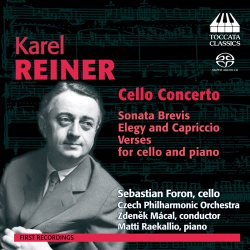|

Support us financially by purchasing
this through MusicWeb
for £10.50 postage paid world-wide.

|
Karel REINER (1910-1979)
Cello Concerto, Op.34 (1941-43) [33:03]
Sonata Brevis, Op.39 (1946) [10:42]
Elegy and Capriccio (1957-60) [11:31]
Verses for viola and piano, arr. cello (1975) [16:26]
Sebastian Foron (cello)
Czech Philharmonic Orchestra/Zdenĕk Mácal (concerto)
Matti Raekallio (piano)
rec. 2-3 December, 2010, live, Dvořák Hall, Rudolfinum, Prague (Concerto) and June 2011, Yamaha Studio, Fifth Avenue, NYC
TOCCATA SACD TOCC 0083 [71:31]
Karel Reiner was born just north-west of Prague in 1910, the son of a cantor, and was a student of Josef Suk and Alois Hába at the conservatoire. He wrote a significant amount of incidental music in the 1930s for the progressive Prague theatre – amongst others he wrote for Emil Burian, a leading light of the theatrical avant-garde. Like Burian, Reiner was imprisoned during the Nazi take-over of Czechoslovakia, first in the holding camp at Terezín and then in Dachau. Reiner’s music has made no headway up till now, because he was tainted with the Hába quarter-tone brush and then because he was considered a formalist in repressive and dictatorial post-war Prague. The repercussions of 1968 were made evident for Reiner in 1970 when he was stripped of his positions and his music banned – one of those positions, incidentally, was Secretary of the Union of Czechoslovak Composers. Reiner died in 1979.
He’s represented in this disc by his works for cello. The Concerto was the last work to be completed before he was sent to Terezín or, as the notes have it, ‘deported into the Fascist concentration camp’. Given that there seems to have been no subsequent performance this live recording appears to be its premiere performance. It’s cast in three movements, opening with some mosaic-like fragmentary phrases without the consolation of long lines or cantilena. This immediately introduces the element of uncertainty, soon to be compounded by urgency. One aspect of the problems the music poses is that there are a few places where soloist Sebastian Foron has to play an octave higher than written – doubtless, had he had the opportunity, Reiner would have been able to red-line those passages where the cello can’t easily be heard. The central movement is marked cantabile ed espressivo but it’s still tautly urgent and orchestrally emphatic, whilst the cello often takes refuge in the murmuring depths of its range. Even the dance patterns of the finale are somewhat acerbic and astringent and whilst the solo trumpet adds a voice of its own, the orchestration is largely stripped back, and the music moves towards an aloofly melancholic close, before finally ending in a worryingly abrupt gesture.
The Concerto was recorded live in the Rudolfinum in December 2010 and the three remaining chamber works followed in June 2011, at the Yamaha Studio in New York. Foron was joined by Matti Raekallio. As the music is programmed chronologically one can trace Reiner’s development immediately via the 1946 Sonata brevis, an exceptionally fluent, kaleidoscopically intriguing work. The slow movement is a funeral march where the cello thrums pizzicati over bell tolls, and where the sense of tense elegy is at its apex. The vital, brief finale sweeps things away, or seems to. The Elegy and Capriccio followed over a decade later, where there’s more yearning and explicit romanticism than one would have expected from Reiner, at least in the Elegy. The Capriccio is genial, quicksilver, and delightfully performed. Finally there is the Verses for viola and piano which have been arranged for cello and played at the original pitch. Sections here are most revealing of Reiner’s affiliation with the Second Viennese School. More than that: one can hear those elements of contrast that are so much a part of Reiner’s musical thought and which repay study.
There is a very interesting booklet to read, and excellently engineered recordings to admire.
Jonathan Woolf
|











